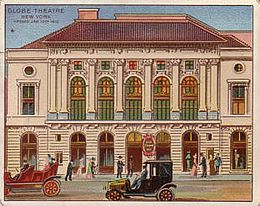Lunt-Fontanne Theatre
Globe Theatre (1910–1957) | |
 Cigarette trading card showing the Globe Theatre, c. 1910s | |
 | |
| Address | 205 West 46th Street New York, New York United States |
|---|---|
| Coordinates | 40°45′33″N 73°59′10″W / 40.75922°N 73.9861°W |
| Owner | Stahl Organization and Nederlander Organization |
| Operator | Nederlander Organization |
| Type | Broadway |
| Capacity | 1,509 |
| Production | Criss Angel Raw — The Mindfreak Unplugged |
| Construction | |
| Opened | 10 January 1910 |
| Closed | 1931 |
| Reopened | 5 May 1958 |
| Rebuilt | 1957 |
| Years active | 1910–1931 1958–present |
| Architect | Carrere & Hastings |
| Website | |
| broadwaydirect | |

The Lunt-Fontanne Theatre (previously known as the Globe Theatre) is a Broadway theatre located at 205 West 46th Street in midtown-Manhattan.
History
Designed by the architect firm of Carrere and Hastings, it was built by producer Charles Dillingham and opened as the Globe Theatre (in honor of London's Shakespearean playhouse) on January 10, 1910 with a musical entitled The Old Town. Although it was situated on 46th street with a grand Beaux-Arts facade, it also had a small entrance on Broadway between 46th and 47th Streets. Most of the Globe's early shows were dramatic plays, including two revivals of La Dame aux Camélias. In the late teens and 1920s, the focus shifted to musicals.
The original design and construction called for the ceiling and the roof 20 feet above it to roll back to reveal starlight and keep the theatre cooler in summer. No other Broadway theatre had such a design. There is no record of it ever actually opening. Other innovations included seats being individually cooled by ice or heated by hot air from vents underneath.[1]
In the 1930s, the Globe was converted into a movie house operated by the Brandt chain. City Playhouses Inc. (which consisted of developers Robert W. Dowling and William Zeckendorf) bought it in 1957 and had the firm Roche and Roche gut renovate it. Major changes were made, including the removal of the second balcony level, the Broadway entrance, and much of the original decor. It was rechristened the Lunt-Fontanne in honor of Alfred Lunt and Lynn Fontanne and reopened on May 5, 1958 with Friedrich Dürrenmatt's The Visit, starring the distinguished theatrical couple.
In 1960, City Playhouses sold the theatre to producers Cy Feuer and Ernest H. Martin; they sold it on to developer Stanley Stahl in 1965.[2][3][4] The theatre, which seats 1,415, is currently co-owned by the Stahl Organization and the Nederlander Organization.
Production history
- 1910: The Echo[5], which featured the now-popular song Skidamarink
- 1914: Chin Chin
- 1918: Ziegfeld Follies
- 1920: George White's Scandals
- 1925: Aren't We All?; No, No, Nanette
- 1928: She's My Baby with Clifton Webb as Clyde Parker[6]
- 1931: The Cat and the Fiddle
- 1958: Goldilocks
- 1959: The Sound of Music
- 1962: Little Me
- 1964: Ben Franklin in Paris
- 1965: Skyscraper
- 1966: Walking Happy
- 1967: How Now, Dow Jones
- 1967: Marlene Dietrich in concert
- 1968: Her First Roman
- 1970: The Rothschilds
- 1972: Ambassador
- 1973: 6 Rms Riv Vu
- 1974: The Sunshine Boys
- 1978: Hello, Dolly!
- 1979: Beatlemania
- 1980: Peter Pan
- 1981: Sophisticated Ladies
- 1983: Private Lives
- 1984: The Wiz
- 1986: Smile
- 1995: Hello, Dolly!
- 1997: Titanic
- 1999: Beauty and the Beast
- 2007: The Little Mermaid
- 2010: The Addams Family
- 2012: Ghost the Musical; A Christmas Story: The Musical
- 2013: Motown: The Musical
- 2015: Finding Neverland
- 2016: Frankie Valli and the Four Seasons on Broadway!; Kristin Chenoweth: My Love Letter to Broadway
- 2017: Charlie and the Chocolate Factory
- 2018: Summer: The Donna Summer Musical
- 2019: Morrissey; Pure Yanni; Mel Brooks on Broadway; Regina Spektor: Live on Broadway; Criss Angel Raw — The Mindfreak Unplugged; Dave Chappelle Live on Broadway; Manilow Broadway; Tina: The Musical
See also
- List of New York City Designated Landmarks in Manhattan from 59th to 110th Streets
- National Register of Historic Places listings in Manhattan above 59th to 110th Streets
References
- ^ The New York Times (February 1, 1998). Gray, Christopher. "Streetscapes/The Lunt-Fontanne; 1910 Theater, Once the Globe, Could Open to the Sky "
- ^ The New York Times (August 15, 1960). Zolotow, Sam. "Feuer and Martin Acquire Theatre"
- ^ The New York Times (July 8, 1964). "Feuer and Martin Buy Lunt-Fontanne Theater"
- ^ The New York Times (March 10, 1965). Zolotow, Sam. "Feuer and Martin Sell Lunt-Fontanne Theater"
- ^ "The Echo – Broadway Musical – Original - IBDB". www.ibdb.com.
- ^ Parker, John (ed.) (1947). Who's Who in the Theatre, 10th revised edition, London: 1430
Further reading
- Broadway Theatres: History and Architecture, William Morrison, 1999, Dover Publications, ISBN 0-486-40244-4
- "The Globe Theatre Opens With Success". The New York Times. January 11, 1910.
